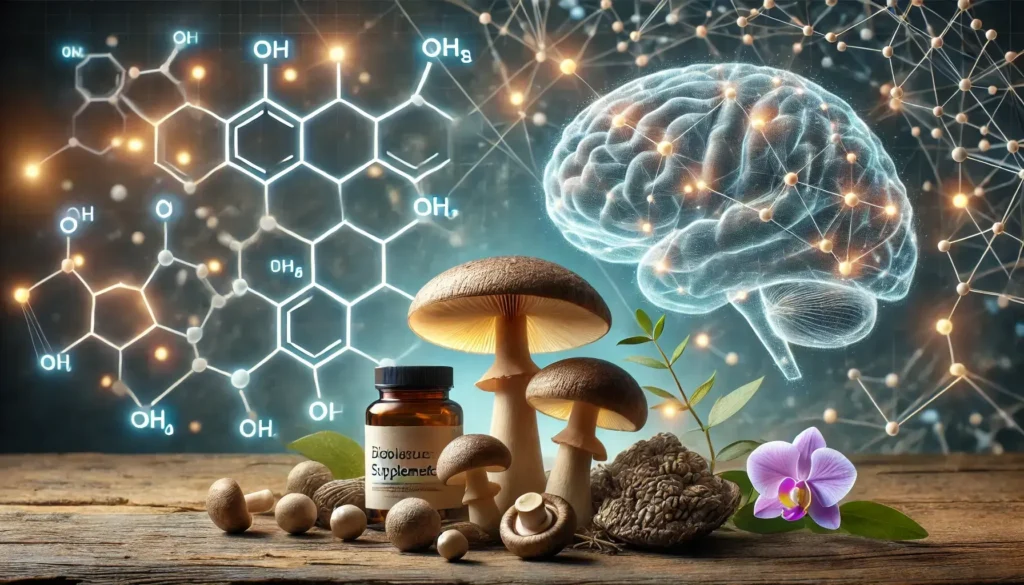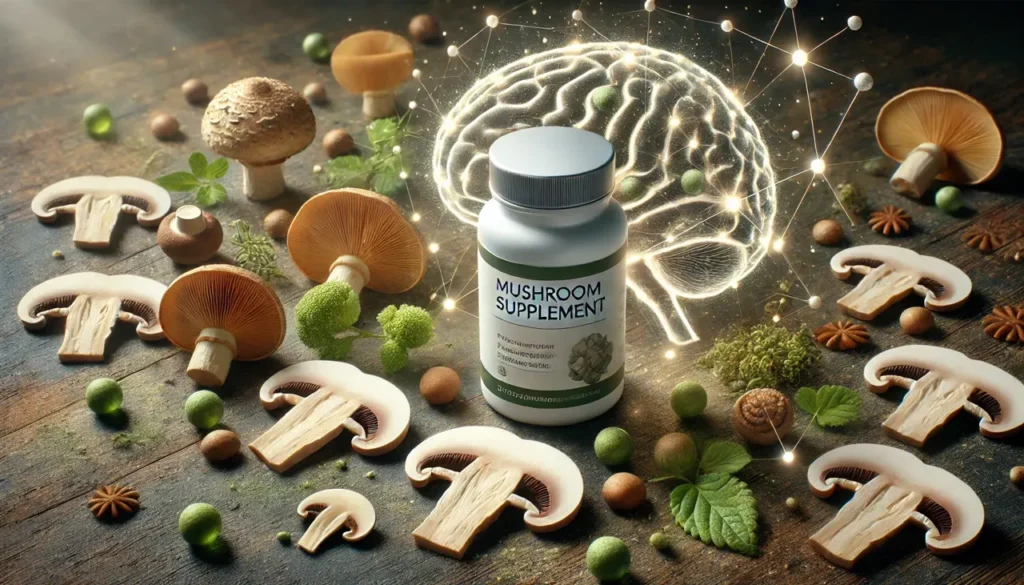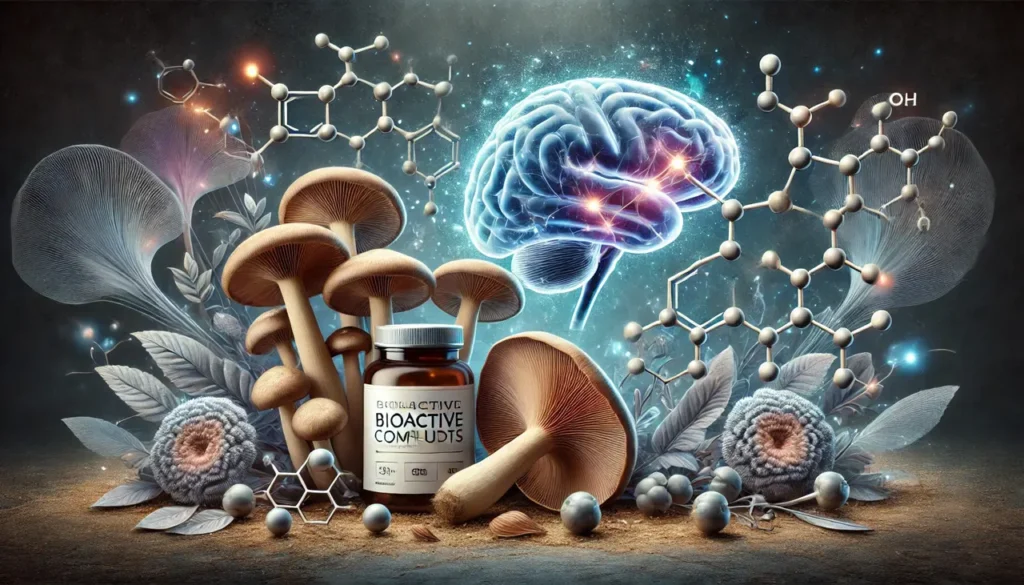Poria mushroom, scientifically known as Wolfiporia extensa or Poria cocos, is a medicinal fungus traditionally valued in Chinese, Japanese, and Korean herbal medicine. Used for centuries as a tonic for overall health, Poria has recently gained attention as a potential nootropic supplement, sparking interest in its effects on brain health, cognitive performance, and stress resilience. This article provides a scientific analysis of Poria mushroom, covering its source, chemical constituents, physiological mechanisms, potential nootropic benefits, recommended dosages, side effects, interactions, and key considerations for safe supplementation.
You May Also Like:
Source and Traditional Uses of Poria Mushroom
Poria mushroom is a polypore fungus primarily found on the roots of pine trees. It is recognized in traditional Chinese medicine (TCM) as a remedy for various ailments, including anxiety, digestive issues, and insomnia. Known as “Fu Ling” in TCM, Poria has long been praised for its adaptogenic qualities, supporting bodily resilience against stressors. The dried sclerotium (the compact, hardened mycelium) is most commonly used in herbal formulations, often mixed with other adaptogens to promote a balanced mood, improved sleep, and overall vitality. Although its use has been documented for centuries, modern studies are investigating the bioactive compounds in Poria that may contribute to its nootropic effects.
Transform Your Cognitive Health with Amazon’s Best Nootropic Supplements—Find Out More!

Chemistry of Poria Mushroom
Poria mushroom contains various bioactive compounds, primarily polysaccharides, triterpenoids, and sterols. Each of these plays a role in the mushroom’s purported health benefits, particularly in promoting neuroprotection, anti-inflammatory effects, and immune support.
- Polysaccharides: Poria’s polysaccharides are among its most studied compounds, exhibiting immune-modulating and antioxidant properties. These complex carbohydrates, particularly pachymaran, help protect cells from oxidative damage and regulate immune responses.
- Triterpenoids: The triterpenes in Poria, specifically poricoic acids, have shown potential for supporting cellular health by regulating inflammatory pathways and promoting neuronal health.
- Sterols: Poria’s sterols, including ergosterol, exhibit anti-inflammatory effects and may support cognitive functions by stabilizing cell membranes, reducing neuroinflammation, and preserving brain cell function.
These bioactive compounds suggest that Poria mushroom’s chemistry supports both brain health and systemic wellness, particularly through antioxidant and anti-inflammatory mechanisms. These functions are crucial for nootropic support, as they protect and enhance cellular function in the brain.

Physiological Mechanisms of Poria in the Body and Brain
The primary mechanisms by which Poria mushroom exerts its effects on the brain include modulation of the immune system, antioxidant defense, and anti-inflammatory action.
- Immune System Modulation: Poria’s polysaccharides help regulate immune function, which indirectly benefits brain health by reducing systemic inflammation. Chronic inflammation has been linked to cognitive decline and neurodegenerative diseases, so reducing this inflammation may help in protecting cognitive function.
- Antioxidant Defense: Poria contains antioxidant compounds that neutralize free radicals, reducing oxidative stress in the brain. This mechanism is crucial for preventing neurodegeneration, as oxidative stress is a known contributor to age-related cognitive decline and diseases like Alzheimer’s.
- Anti-inflammatory Action: Poria’s triterpenes possess anti-inflammatory properties that help mitigate neuroinflammation. Inflammation in the brain disrupts cognitive processes, and chronic neuroinflammation has been associated with conditions such as depression and Alzheimer’s disease. By inhibiting inflammatory markers, Poria may support improved cognitive resilience and mood stability.
- Support for Brain Cell Health: The sterols in Poria help stabilize neuronal cell membranes, which is vital for cell function and signaling. This stabilization aids in maintaining cellular health under stress, which is particularly beneficial in the context of mental stress and cognitive fatigue.
Maximize Your Sleep Quality with Amazon’s Top Sleeping Supplements—Explore Now!
Nootropic Benefits of Poria Mushroom
Poria mushroom’s potential nootropic effects stem from its role in reducing inflammation, supporting neurotransmitter regulation, and protecting brain cells from oxidative stress. Its primary benefits as a nootropic are summarized as follows:
1. Stress Resilience and Adaptation: As an adaptogen, Poria may enhance the body’s response to stress, reducing cognitive fatigue and supporting mental clarity. Adaptogens like Poria work by modulating the hypothalamic-pituitary-adrenal (HPA) axis, a critical pathway for managing stress responses. By balancing cortisol levels, Poria could improve mental endurance and resilience, helping the brain adapt to prolonged stressors. Additionally, Poria’s adaptogenic effects may enhance overall energy levels and support more stable mood dynamics, making it beneficial for individuals facing chronic stress or burnout. This stress resilience fosters a more sustainable cognitive environment for focus and mental processing.
2. Cognitive Clarity and Memory: Poria’s antioxidative properties protect neurons from free radical damage, helping maintain cognitive function and memory. Reduced oxidative stress is linked to better neuronal communication, and in some studies, Poria has been associated with improved memory retention and cognitive processing. Additionally, Poria’s polysaccharides may support neurogenesis—the growth of new brain cells—which contributes to long-term cognitive function. This protective effect against cellular damage helps preserve mental clarity over time, reducing the cognitive fog that often accompanies age-related decline or prolonged stress.
3. Mood Stabilization and Anxiety Reduction: Poria contains compounds that may help stabilize mood and reduce anxiety, possibly by influencing GABA receptors. GABA, a neurotransmitter associated with calming effects, is essential for reducing overactive neural responses that often contribute to anxiety and mood disorders. Through its calming effects, Poria may promote relaxation, helping individuals better manage anxiety-inducing situations. Additionally, Poria may influence serotonin pathways, further supporting a balanced mood and enhanced emotional resilience, particularly in times of heightened stress.
4. Improved Sleep Quality: Traditionally used as a sleep aid, Poria may improve sleep by promoting relaxation and reducing stress-related sleep disturbances. As sleep is vital for cognitive processing and memory consolidation, Poria’s sleep-enhancing properties indirectly support cognitive health and mental clarity. Poria’s effect on the GABAergic system could improve sleep latency, helping individuals fall asleep more easily and experience deeper, more restorative sleep. Enhanced sleep quality also contributes to reduced cognitive fatigue, promoting greater mental sharpness and emotional balance during waking hours.
5. Enhanced Immune Support for Cognitive Health: Poria’s polysaccharides play a role in modulating immune function, which indirectly benefits brain health. A well-regulated immune system reduces systemic inflammation, thereby protecting the brain from inflammation-related damage. Chronic inflammation has been linked to neurodegenerative conditions; by supporting immune balance, Poria could help create a healthier environment for neurons. Poria’s immune-regulating effect could also bolster the body’s resilience against infections, further enhancing overall well-being and cognitive function.
6. Neuroprotection and Anti-Aging Effects: The antioxidant and anti-inflammatory properties of Poria support neuroprotection, shielding brain cells from age-related damage. By reducing oxidative stress and inflammation, Poria may slow the cellular aging process, which is essential for preserving cognitive abilities over time. This neuroprotective quality is especially beneficial for individuals concerned with long-term cognitive health, as it may help prevent conditions such as mild cognitive impairment and dementia. Furthermore, the sterols in Poria could enhance cell membrane stability, helping brain cells retain their structure and functionality as they age.

Dosage and Supplementation Guidelines
The recommended dosage for Poria mushroom varies based on the form of the supplement and its intended purpose. For nootropic support, the dosage typically ranges from 1 to 5 grams of dried Poria extract per day. However, it is advisable to start with lower doses and adjust according to individual tolerance and response.
- General Cognitive Support Dosage: For individuals seeking general cognitive enhancement and stress resilience, 1 to 3 grams of Poria extract daily is often sufficient.
- Sleep and Relaxation Dosage: For individuals using Poria to support sleep, a dose of around 3 to 5 grams, taken in the evening, may be effective.
- Supplement Forms: Poria is available in various forms, including powdered extract, capsules, and as part of herbal nootropic blends. While powdered forms are common in traditional medicine, capsules are a convenient option for precise dosing.
Because the ideal dosage may vary based on individual needs, it is advisable to consult with a healthcare provider before beginning supplementation, particularly if high doses are considered for therapeutic purposes.
Support Your Brain’s Health with Reishi Mushroom—Find the Best Options Now!

Side Effects and Safety Considerations
Poria mushroom is generally well-tolerated, with few reported side effects. However, as with any supplement, certain risks and side effects should be considered:
- Digestive Disturbances: In some individuals, Poria may cause mild digestive symptoms such as nausea or upset stomach, particularly at high doses.
- Allergic Reactions: Although rare, allergic reactions may occur. Symptoms of an allergic reaction include itching, rashes, and swelling. Discontinue use and seek medical advice if any allergic symptoms appear.
- Interactions with Immune-Modulating Medications: Due to its immune-modulating effects, individuals taking immunosuppressive drugs should exercise caution, as Poria may enhance or interfere with these medications.
- Long-Term Safety: Although no severe side effects have been reported, the long-term safety of Poria mushroom supplementation at high doses has not been extensively studied. For those considering long-term use, periodic evaluations with a healthcare provider are recommended to monitor any adverse effects.
Potential Drug and Supplement Interactions
Poria mushroom may interact with various medications and supplements. These interactions can impact both the efficacy of the drugs and the intended benefits of Poria.
- Immunosuppressants: Since Poria exhibits immune-modulating properties, it may potentially interfere with immunosuppressant medications such as corticosteroids. Patients on these medications should consult with a healthcare provider before taking Poria to avoid adverse effects or reduced medication efficacy.
- Sedatives and Sleep Aids: Poria’s relaxing properties may enhance the effects of sedatives, including benzodiazepines and sleep aids. Concurrent use may lead to excessive sedation, and dosage adjustments may be necessary if Poria is added to a regimen involving these medications.
- Anticoagulants: Some compounds in Poria may exhibit mild blood-thinning effects. Individuals taking anticoagulant medications such as warfarin should use caution with Poria, as it may increase bleeding risk.
- Adaptogenic and Nootropic Stacks: Combining Poria with other adaptogens or nootropics, such as ashwagandha or rhodiola, may enhance its cognitive and stress-relieving effects. However, the combination of multiple supplements should be carefully managed to prevent overstimulation or adverse interactions.
Risks for Individuals with Certain Health Conditions
While Poria mushroom is safe for most individuals, specific health conditions may require additional caution:
- Autoimmune Conditions: Given its immune-modulating properties, Poria may not be suitable for individuals with autoimmune conditions, such as lupus or rheumatoid arthritis. In such cases, Poria’s immune-enhancing effects could potentially exacerbate symptoms, and its use should be discussed with a healthcare provider.
- Pregnancy and Breastfeeding: Due to limited research on the effects of Poria mushroom during pregnancy and breastfeeding, it is generally advised that individuals in these categories avoid using Poria as a supplement.
- Kidney and Liver Disorders: For individuals with compromised liver or kidney function, the metabolic processing of Poria could place additional strain on these organs. Consultation with a healthcare provider is recommended to assess the suitability of Poria for such individuals.
Unlock the Dual Benefits of Potassium for Physical Energy and Brain Power—Buy Today on Amazon!

Conclusion: Evaluating the Use of Poria Mushroom as a Nootropic Supplement
Poria mushroom’s adaptogenic and neuroprotective properties make it a promising candidate for supporting cognitive health, stress resilience, and emotional well-being. Its rich composition of polysaccharides, triterpenoids, and sterols provides antioxidant, anti-inflammatory, and immune-modulating benefits that support the brain’s ability to function optimally under stress. Although generally safe, Poria should be used with caution, particularly for those on medications affecting immune function or blood clotting.
For individuals interested in exploring Poria as a nootropic supplement, it is advisable to consult with a healthcare provider, especially when considering long-term use. With further research, Poria mushroom may continue to reveal new insights into its potential as a natural cognitive enhancer and valuable addition to the field of nootropic supplements.

References:
- Poria Mushroom. Retrieved from: https://www.rxlist.com/supplements/poria_mushroom.htm
- The Health Benefits of Poria Mushrooms. Retrieved from: https://www.verywellhealth.com/the-benefits-of-poria-88643
- Biological activities and potential health benefits of polysaccharides from Poria cocos and their derivatives. Retrieved from: https://pubmed.ncbi.nlm.nih.gov/24751506/
- Chemical constituents and pharmacological properties of Poria cocos . Retrieved from: https://pubmed.ncbi.nlm.nih.gov/21347995/
Important Note: The information contained in this article is for general informational purposes only, and should not be construed as health or medical advice, nor is it intended to diagnose, prevent, treat, or cure any disease or health condition. Before embarking on any diet, fitness regimen, or program of nutritional supplementation, it is advisable to consult your healthcare professional in order to determine its safety and probable efficacy in terms of your individual state of health.
Regarding Nutritional Supplements Or Other Non-Prescription Health Products: If any nutritional supplements or other non-prescription health products are mentioned in the foregoing article, any claims or statements made about them have not been evaluated by the U.S. Food and Drug Administration, and such nutritional supplements or other


